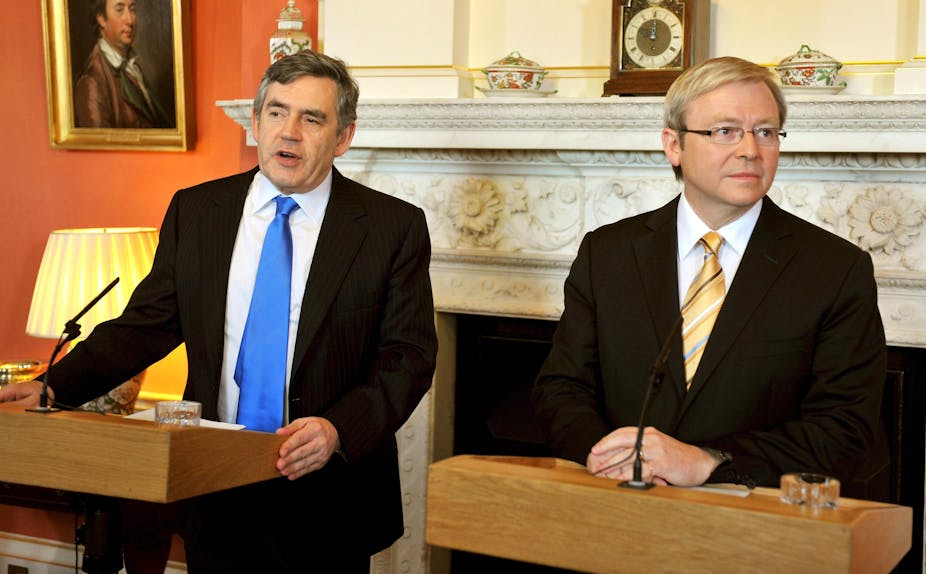What are political parties for? Do they exist only to win elections or are they for the benefit of members with process as important as outcome?
These are the fundamental questions that former British Labour minister and anti-apartheid activist, Peter Hain has been grappling with for Ed Milliband’s Labour Party in the UK.
Much like the Bracks/Faulkner/Carr review of the ALP in Australia, Hain was charged with recommending internal party reform for Labour.
During a recent visit to Australia, Hain declared the Australian Labor Party would be “doomed” without party reform. He warned the organisational structure of all centre-left parties has passed its use by date.
Defeat brings reflection
On assuming the leadership of the Labour Party in late 2010 after suffering a defeat that marked the end of a psychological era, Ed Milliband reportedly declared [New Labour](http://en.wikipedia.org/wiki/New_Labour_(disambiguation) was dead.
As usual for political parties that lose office after an extended period of government Labour considered what went wrong and asked Hain to look at reform.
The party did this under Thatcher and the Tories eventually did this during the New Labour era. But if New Labour “had passed” (to use Milliband’s demure phrase), some among the Labour faithful in Britain must have wondered if it was ever truly a living thing in the first place.
There was a paradox – their electoral success seemed to come at the expense of committed membership and faith in the party. Although recording landslide and comfortable wins in 1997, 2001 and 2005, these victories were founded on historic low turnouts.
Singer Billy Bragg put the hollow support for New Labour well when he said the party was like your old local watering hole that had been sold off and turned into one of those fake “Oirish” pubs: you may not particularly like it, but you had nowhere else to go. The same could probably be said of the Labor party here.
Not dead yet
But Haine’s recommendations to the British Labour Party might suggest that New Labour is not dead, it is just resting.
His main recommendations are three-fold – that the party must open up to its members and give them more say in policy and leadership processes; that those processes must change to be more transparent and accessible; and there must be better local campaigning.
This actually sounds like the Labour Party of the 1960s. No bad thing some might say, but Hain is not advocating an advance into the past, at least not as far back as the 60s. Instead he talks about retaining Blair’s legacy and in particular appealing to “middle England” (what we would call aspirational voters here).
The risk here is that the dwindling core support amongst working class Britons is taken for granted and ignored, compounding the trend in apathy towards formal politics evident in Britain (and elsewhere) since the 1990s.
This “modernisation” becomes an end in itself at the expense of members of the party and its supporters.
Lessons for Australia
Hain has been speaking to Australian colleagues and comparing notes on internal party reform. And here is another paradox: to push through its reform agenda, New Labour is benefiting from the centralised control that put off many of its members in the Blair-Brown years.
Authority in the ALP remains more diffuse with more entrenched interests in its federal and state structures. Add to that the power of the factions to decide who gets into senior positions and cabinets (although we are usually told that the factions are under control by whoever is in charge at the time) and one can begin to appreciate the potential brakes on meaningful change.
But should the ALP change along the British lines set out by Hain? The similarities between the parties are well known, but they are different parties responding to politics in different national and international contexts.
Reinvigorating political parties must be good for the democratic life of nations and each party needs to attend closely to the concerns of its potential members and supporters which will differ from place to place.
Clear choices
Clearly we are beyond an Old Labour/New Labour dichotomy. We are moving into an era of Renewed Labour.
Boosting membership, reducing reliance on media-driven communications and building greater community involvement will be crucial, but this will involve some loss of power from the centre.
The political centre can hold if it has the vision to see that sometimes power devolved is power retained. This is the choice before the British and Australian Labour Parties.

